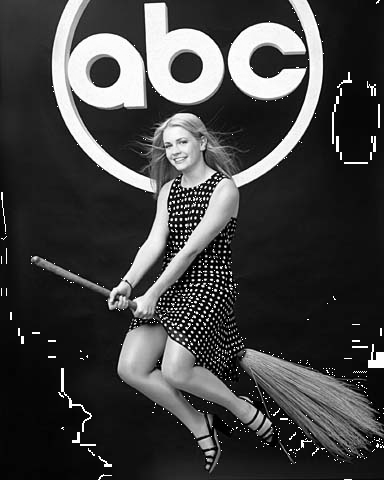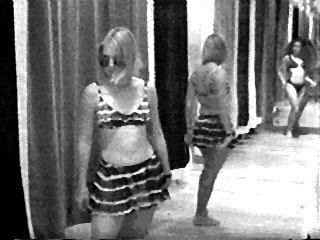Trash TV #1: Sabrina, the Teenage Witch
When the entertainment colossus which is The Simpsons finally hove into view on the BBC, the commercial network feared it’d take out Baywatch, which ran in the same slot. And so, instead they sent in a sacrificial lamb, in the shape of new American series, Sabrina, the Teenage Witch. But, verily, a miracle took place in the ratings: Sabrina improved the audience over what “the world’s most popular TV show” had managed, and pulled in better figures than The Simpsons too. So it was they who were sent packing from Saturday evenings, replaced by that popular icon of youth culture, Dad’s Army.
The reason for this was simple; Sabrina is far better than you expect. Indeed, there’s a good case to be made for putting it above the early Simpsons which the BBC screened. Video permitted a straightforward comparison on a show-by-show basis: about 70% of the time, I found Sabrina more entertaining. But perhaps a more accurate comparison is with another teen-com, the series based on Clueless, which appeared immediately before Sabrina on ITV. It is so stultifyingly unfunny, it might have been specifically chosen to make Sabrina look like a comedic supernova.
It’s a curiously subversive show, replacing the well-tested nuclear family unit with three women – a physicist, a concert violinist and a schoolgirl, all of them witches. The first two, Zelma and Hilda are Sabrina’s aunts, her parents being…elsewhere [I missed the pilot episode!]. The only man in the house is a cat: Salem, turned into a feline for a failed attempt at world domination. Hmm, pick the psychosexual bones out of that cosy little household.

Sabrina is coming to terms with her, um, witchiness, but rather than using magic to, say, stop world hunger, is more interested in getting boys to like her. Such disinterest isn’t really plausible; actress Melissa Joan Hart sets more than one gentleman of my acquaintance drooling — though we’d better draw a veil over the identities of those who prefer the younger Melissa from Clarissa Explains It All…
Anyway, putting teenophile lust aside, this scenario could be an excuse for patronising dogma of the obvious sort, but generally isn’t. While there may be a moral, it has a pleasing tendency to go against the grain: one episode could be summed up as “helping people isn’t necessarily a good thing”. For American TV, this is only marginally less revolutionary than “it’s okay to slaughter your parents in the name of Satan”.
It benefits from a rapid turnover in episodes. With The Simpsons, we get material the best part of a decade old, whose best jokes have already been repeated by every bastard with satellite TV. Instead, the gap between first American and British transmission for Sabrina can be as little as 48 hours, which helps the frequent cross-references to other pop culture. Like The Simpsons, there’s also usually a gratuitous celebrity cameo; some, notably Penn Gillette’s wildly OTT appearances as the witches’ boss, work better than the apparently random baseball or pop star appearances. Other highlights include Cary-Hiroyuki Tagawa (the bad guy from Mortal Kombat), and Raquel Welch in a costume definitely unsuitable for family viewing…
While by no means perfect, even its weaknesses seem to warp into something that approach strengths; the laugh track is dreadfully grating, but only bespatters the obvious lines, the more subtle, and better, humour is left for you to enjoy in splendid isolation. It has its fair share of naff episodes, but that’s inevitable when you take risks, especially in the sterile world of the American sitcom. And Salem is played by a moth-eaten animatronic puppet, yet the effect is charming rather than pathetic (and it improves drastically as the series progresses, to the point where a Frank Sinatra impression is plausible). For, as with all shows, it lives or dies by its characters, and in Sabrina, they are plausible and memorable creations.
The series is a notable prime-time hit on American television, regularly in the top 30, and reaching #14 over Christmas. But ITV decided to ignore the ratings on both sides of the Atlantic, and replaced Sabrina with, yep, Baywatch, largely relegating the superior show to re-runs during Children’s ITV on Wednesday afternoon. Doh! No matter; as far as I am concerned, the name ‘Sabrina’ is no longer exclusively linked with a large-breasted Italian singer in the Trash City Hall of Fame.

An interesting variant is the TVM which predates the series; while Hart still plays the central character, her aunts are different actresses and the overall feel is darker. The absence of a laugh track is a genuine pleasure, allowing you to pick up on little things like the sound of a jet engine, tucked in to accompany Sabrina’s magic-enhanced javelin throw.
The discovery of her supernatural powers is charmingly handled, with more deftness than you’d expect from Tibor Takacs, director of naff 80’s horror Hardcover. However, this is probably down to Melissa Joan Hart’s highly personable performance, which is sweet without ever slipping into schmaltz. This is the stuff of which teenage dreams are made: the ability to take on the richest, prettiest, most popular girl in school and win.

It’s surprisingly unfunny, though deliberately so, preferring to play things straight, and the lack of subversive elements does leave it occasionally suffering from a certain over-earnestness. This is mostly down to the aunts, wishy-washy, new Age characters, rather than the feisty eccentrics they became in the series. Add in a climax that keeps heading towards Carrie without ever getting there, and you do have a highly different view of the Sabrina-verse from the television show.
We get a Melissa with short hair, which I’m not sure about. I’m also deeply unsure about a sequence in which Sabrina and best friend try on swimming costumes for a pool party. It’s both fascinating, and disturbing-because-it’s-fascinating. Worse still, on the laser-disk – yep, I’m that sad – it’s even chapter-stopped. Chapter seven, to be exact. Though at least I didn’t do the accompanying frame grabs; maybe I’m not quite so sad after all…